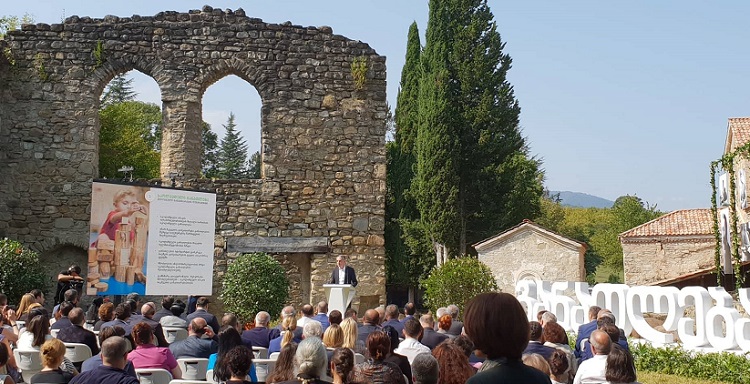Gov’t presents education reform strategy

Government presented the new education reform strategy in Ikalto, where one of the first Georgian academies was built in the 11th century. Photo: Education Ministry press office.
Georgian Prime Minister Mamuka Bakhtadze and Education Minister Mikheil Batiashvili have presented a strategy for Georgian education reform today in Ikalto, in the Kakheti region of eastern Georgia, where one of the first Georgian academies was built in the 11th century.
The reform which will be implemented by the Education Ministry of Georgia includes the provision of new learning methods in Georgian public schools, particular support to pre-school and vocational education, changes in common national exams for higher education, modern infrastructure in education institutions and increased salaries for teachers.
PM Bakhtadze stated that new learning models will be initially implemented in 50 public schools and the number of such schools will increase to 2,000 by the year 2023.
The new model will be a merger of international experience with the Georgian reality and Georgian scientific and pedagogic experience,” Bakhtadze said.
We will also pay particular attention to pre-school education, which is the base for future and vocational education,” Bakhtadze said.
He said that the education reform will cover all five directions in Georgia: preschool, general, vocational, higher education and science.
PM Bakhtadze said that 10,000 teachers, teachers for children with special needs among them, will receive increased salaries in 2018-2019.
Salaries for teachers will increase three times by 2022,” Bakhtadze said.
Batiashvili stated that the average salary for teachers by 2022 will be 1,500 GEL, while teachers with higher qualification will receive 2,000 Gel.
All schools in Georgia should be of high standards. We should not have only several, fashionable and top quality schools,” Bakhtadze said.
Batiashvili announced that after a consultation with foreign experts a new model of general national exams will be established by 2020, referring to the exams for higher education.
 Tweet
Tweet  Share
Share